
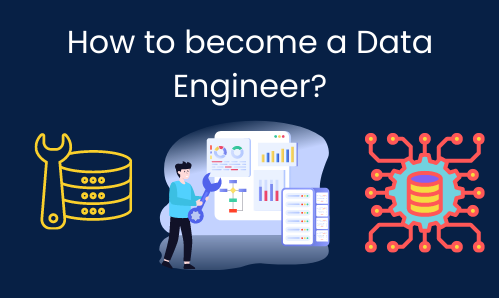
Big data is changing the way we do business and creating a need for data engineers who can collect and manage large quantities of data.
Data engineering is the practice of designing and building systems for collecting, storing, and analysing data at scale. It is a broad field with applications in just about every industry. Organizations have the ability to collect massive amounts of data, and they need the right people and technology to ensure it is in a highly usable state by the time it reaches data scientists and analysts.
In addition to making the lives of data scientists easier, working as a data engineer can give you the opportunity to make a tangible difference in a world where we’ll be producing 463 Exabyte’s per day by 2025. That’s one and 18 zeroes of bytes worth of data. Fields like machine learning and deep learning can’t succeed without data engineers to process and channel that data.

Data engineers are responsible for designing, maintaining, and optimizing data infrastructure for data collection, management, transformation, and access. They are in charge of creating pipelines that convert raw data into usable formats for data scientists and other data consumers to utilize. The data engineer role evolved to handle the core data aspects of software engineering and data science; they use software engineering principles to develop algorithms that automate the data flow process. They also collaborate with data scientists to build machine learning and analytics infrastructure from testing to deployment.
The amount of data an engineer works with varies with the organization, particularly with respect to its size. The bigger the company, the more complex the analytics architecture, and the more data the engineer will be responsible for. Certain industries are more data-intensive, including healthcare, retail and financial services.
Data engineers work in conjunction with data science teams, improving data transparency and enabling businesses to make more trustworthy business decisions.
Data engineers work in a variety of settings to build systems that collect, manage, and convert raw data into usable information for data scientists and business analysts to interpret. Their ultimate goal is to make data accessible so that organizations can use it to evaluate and optimize their performance.
These are some usual tasks you strength achievements while operating with data:
Working at smaller companies often means taking on a greater variety of data-related tasks in a generalist role. Some bigger companies have data engineers dedicated to building data pipelines and others focused on managing data warehouses—both populating warehouses with data and creating table schemas to keep track of where data is stored.
Data scientists and data analysts analyse data sets to glean knowledge and insights. Data engineers build systems for collecting, validating, and preparing that high-quality data. Data engineers gather and prepare the data and data scientists use the data to promote better business decisions.
Let’s talk about the crown analysing between Data Engineer vs Data Analyst:
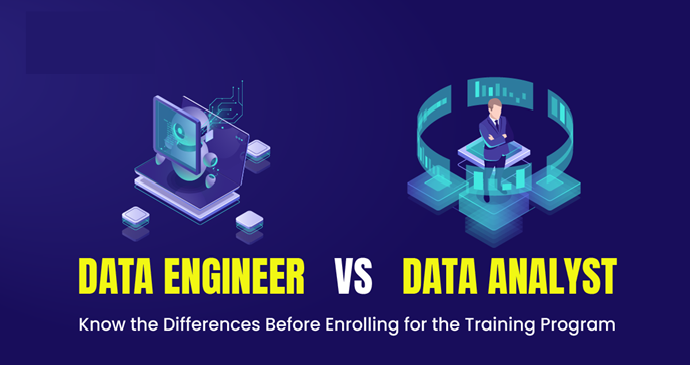
|
|
Data Engineer |
Data Analyst |
|
Definition |
Data engineers are involved in the data preparation process. They design, build, test, and maintain the entire architecture. |
Data analysts examine numerical data and use it to assist businesses in making better decisions. |
|
Focus |
A data engineer who is focused on database architecture. Build data pipelines integrating multiple data repositories within the firm as well as third-party data sources as a data engineer. |
A data analyst is someone interested in numbers. Data analysts create operational reports based on enterprise data using visualization tools. |
|
Works On |
Data engineers work with data lakes, cloud platforms, and data warehouses in the cloud, as well as on premise technology, Data warehouses, and ETL. |
Data engineering and data science. |
|
Job Responsibility |
A data engineer’s job entails creating, testing, and maintaining a complete data architecture. They also use statistical models to assure the accuracy of data. |
A data analyst’s tasks include data representation through reporting and visualization, data acquisition and maintenance, and data statistical efficiency optimization. |
|
Techniques Used |
Data management tools, apache Hadoop a data engineering framework. |
Descriptive and inferential statistics. |
|
Programming Language |
Apache Spark, REST API. |
|
|
Tools Used |
Hadoop, Kubernetes, Yarn. |
Preferably SQL And Microsoft Excel., BI tools. |
|
Use Cases |
Social media, Market Analysis. |
Event-driven, Data Capture |
|
Experience |
Cloud infrastructure and visualizations. |
Certification on Data analysis and knowledge on SQL. |
|
Skill Sets |
Hadoop-based Analytics, Machine learning concept knowledge, Data architecture & pipelining. |
Data Warehousing, Adobe & Google Analytics, Scripting & Statistical skills, Reporting. |
|
Career Path |
Senior Data Engineer, Lead Software Engineer, Data Scientist. |
Senior Data Analyst, Analytics Manager, and Business Analytics. |
A career in this field can be both rewarding and challenging. You’ll play an important role in an organization’s success, providing easier access to data that data scientists, analysts, and decision-makers need to do their jobs. You’ll rely on your programming and problem-solving skills to create scalable solutions.
As long as there is data to process, data engineers will be in demand. In fact, Dice Insights reported in 2019 that data engineering is a top trending job in the technology industry, beating out computer scientists, web designers, and database architects. LinkedIn listed it as one of its jobs on the rise in 2023.
The reality is that so long as data is used in a business to drive decision-making or answer business questions, the demand for data engineers will remain. So if you're interested in pursuing a career in data engineering, there has never been a better time.
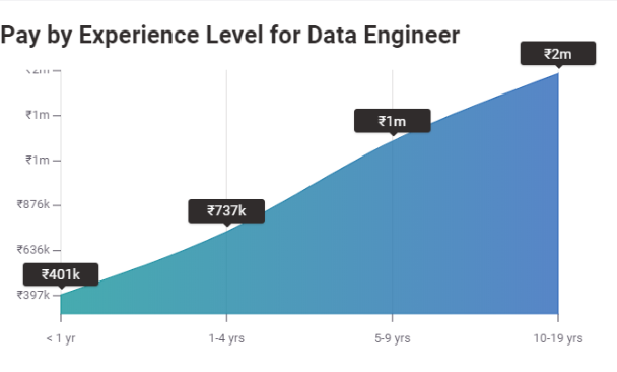
Experience matters a lot in deciding the average data engineer salary in India. Experience tells a lot about your personality, contributions in the field, and knowledge about the industry and job profile.
Therefore, experience is directly proportional to the better pay structure.
Higher the number of working years and extensive experience portfolio, the better the average salary for a data engineer.
|
Experience Years |
Average Base Salary/annum (In INR) |
|
Fresher (>1 year) |
₹457,532 |
|
Early Career (1-4 years) |
₹720,395 |
|
Mid-Career (5-9 years) |
₹1,294,336 |
|
Experienced (20+ years) |
₹1,867,992 |
Location is another vital factor affecting the average Data Engineer Salary. Some locations have better job opportunities, more demand for the candidates, and, naturally, becomes a hub of thriving possibilities.
|
Location or Cities
|
Average Base Salary/annum (In INR) |
|
Bangalore, Karnataka |
₹931,331 |
|
Pune, Maharashtra |
₹861,549 |
|
Mumbai, Maharashtra |
₹729,561 |
|
Chennai, Tamil Nadu |
₹817,425 |
|
Hyderabad, Andhra Pradesh |
₹980,530 |
|
Gurgaon, Delhi |
₹987,847 |
|
New Delhi, Delhi |
₹902,317 |
|
Kolkata, West Bengal |
₹524,000 |
|
Ahmedabad, Gujrat |
₹450,000 |
|
Jaipur, Rajasthan |
₹560,000 |
Skills are essential to the role of a data engineer. However, some skills are more important than others and therefore, affect the average data engineer salary in India.
Suppose, it is evident that SQL would be more important for a Data Engineer than learning about Microsoft Word.
|
Skill Sets |
Average Base Pay/annum (In INR) |
|
SQL |
₹822,524 |
|
Programming Language (Python) |
₹802,380 |
|
ETL (Extract, Transfer, Load) Skills |
₹872,886 |
|
Apache Spark |
₹966,687 |
|
Data Warehousing Skills |
₹900,000 |
|
Hadoop |
₹872,216 |
Another significant factor that decides the average data engineer salary is a company or the employer. Better companies have better job positions and pay structures for a data engineer.
The fresher’s can also get a good pay base at top-tier companies.
Some of the Top Companies that hire Data Engineers in India are:
Now, let us look at the table below to see the different average base salaries of a data engineer for these top companies in India
|
Company Name |
Average Base Salary/annum (in INR) |
|
Amazon, India |
₹2,010,525 |
|
Deloitte |
₹1,300,000 |
|
HCL Technologies Limited |
₹975,000 |
|
Cognizant |
₹760,353 |
|
IBM India Pvt. Ltd. |
₹709,859 |
|
Tata Consultancy Services |
₹700,000 |
|
Accenture |
₹620,000 |
|
Capgemini |
₹620,000 |
|
InfoSys Limited |
₹513,000 |
|
Wipro |
₹516,000 |
Let us look at the average data engineer salary in other countries.
|
Country
|
Average Base Salary/year |
|
United Kingdom |
£40,360 |
|
United States of America |
$92,541 |
|
Germany |
€56,531 |
|
New Zealand |
NZ$84,454 |
|
Canada |
C$80,554 |
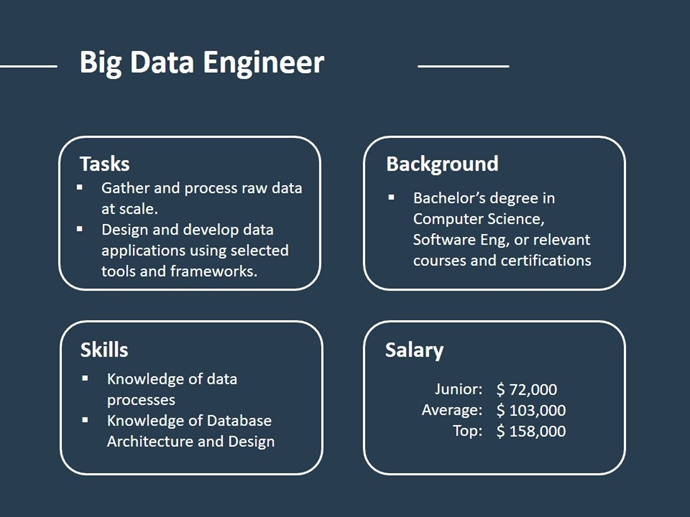
In order to fully understand what a data engineer does, you need to understand the functions of the data architecture.
The three most important functions of data architecture are:
Now based on these functions, Data engineer Role is categorized into three areas.
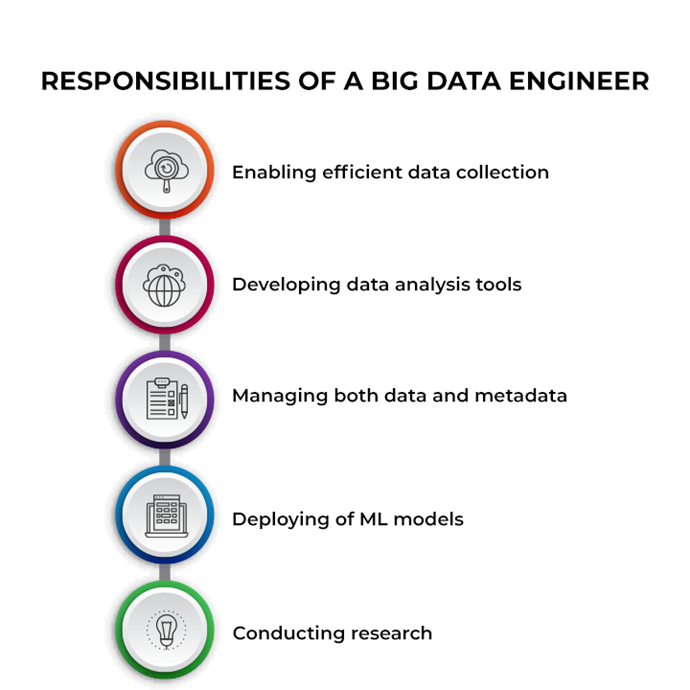
The roles discussed above were specific but on a broader term, there are responsibilities expected from a data engineer.
Those data engineer responsibilities are as follows:
How to grow into a Data Engineer?
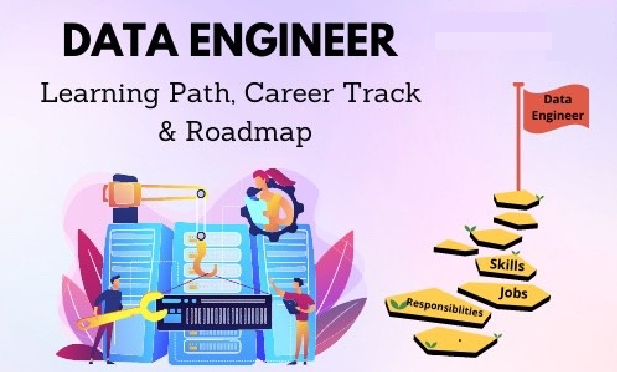
Data Engineering is a flourishing field where not only data-driven companies instead every industry, every business demands a data engineer.
Now, if you are just starting as a data engineer or at a point in your career thinking of switching fields, you might need the right path to become a successful data engineer.
Here is a comprehensive path to becoming a data engineer.
Step 1: Getting the right education
Step 2: Acquire the Skills Required
Step 3: Build Your Portfolio
Step 4: Advance Professionally
Take up on your skills that need mastery, or any other new skill required to become the best data engineer out there.
Keep learning and growing.
This roadmap is not objective but a perfect guide for you to start off as a data engineer.
If you are passionate about software engineering and data analysis, data engineering is what you can explore.
With the combination of analysis and programming, Data Engineering is a discipline that is in huge demand by top-tier industries and companies.
There are no single but multiple reasons to become a data engineer in today’s time.
From better data engineer salaries in India to thriving job opportunities, the data engineer job role has it all.
Start learning skills required to become a data engineer today if you want to explore this flourishing field.
Thank you for taking the time to read this Blog.
Copyright Bitonlinelearn © 2021. All Rights Reserved | Design and Developed By BITINFOTECH